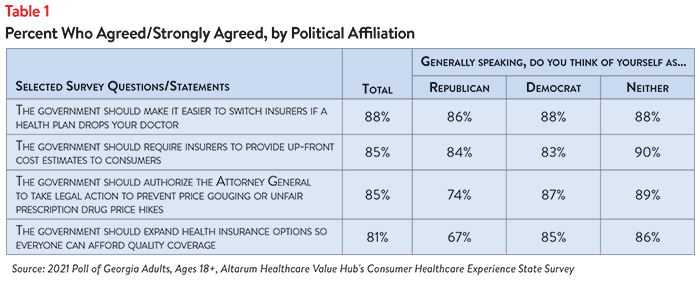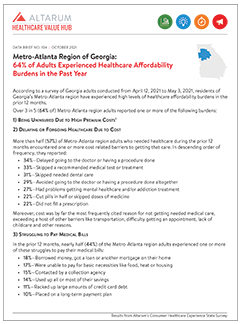Metro-Atlanta Region of Georgia: 64% of Adults Experienced Healthcare Affordability Burdens in the Past Year
According to a survey of Georgia adults conducted from April 12, 2021 to May 3, 2021, residents of Georgia’s Metro-Atlanta region have experienced high levels of healthcare affordability burdens in the prior 12 months.
Over 3 in 5 (64% of) Metro-Atlanta region adults reported one or more of the following burdens:
1) Being Uninsured Due to High Premium Costs1
2) Delaying or Forgoing Healthcare Due to Cost
More than half (57%) of Metro-Atlanta region adults who needed healthcare during the prior 12 months encountered one or more cost related barriers to getting that care. In descending order of frequency, they reported:
- 34%—Delayed going to the doctor or having a procedure done
- 33%—Skipped a recommended medical test or treatment
- 31%—Skipped needed dental care
- 29%—Avoided going to the doctor or having a procedure done altogether
- 27%—Had problems getting mental healthcare and/or addiction treatment
- 22%—Cut pills in half or skipped doses of medicine
- 22%—Did not fill a prescription
Moreover, cost was by far the most frequently cited reason for not getting needed medical care, exceeding a host of other barriers like transportation, difficulty getting an appointment, lack of childcare and other reasons.
3) Struggling to Pay Medical Bills
In the prior 12 months, nearly half (44%) of the Metro-Atlanta region adults experienced one or more of these struggles to pay their medical bills:
- 18%—Borrowed money, got a loan or another mortgage on their home
- 17%—Were unable to pay for basic necessities like food, heat or housing
- 15%—Contacted by a collection agency
- 14%—Used up all or most of their savings
- 11%—Racked up large amounts of credit card debt
- 10%—Placed on a long-term payment plan
High Levels of Worry About Affording Healthcare in the Future
Metro-Atlanta region residents reported high levels of worry about affording healthcare in the future. Nearly 4 out of 5 (79% of) respondents reported being “worried” or “very worried” about one or more of the following topics: affording nursing home and home care services (59%); health insurance becoming too expensive (59%); cost of a serious illness or accident (58%); costs when elderly (55%); cost of needed dental care (54%); prescription drug costs (50%); and losing health insurance (44%).
Dissatisfaction with the Health System and Support for Change
Metro-Atlanta region residents were generally dissatisfied with the health system. Forty percent agreed or strongly agreed with the statement “We have a great healthcare system in the U.S.;” sixty-one percent agreed or strongly agreed that “the system needs to change.”
Respondents see a role for themselves in solving problems. They reported actions they have already taken, like researching the cost of a drug beforehand (64%), as well as actions they should be taking—72% believed that taking better care of their personal health is one of the top things they can do personally to address affordability.
But, in far greater numbers, respondents saw a role for their elected representatives. Examples of strategies that received support across party lines included:

The high burden of healthcare affordability, along with high levels of support for change, suggest that elected leaders and other stakeholders need to make addressing the cost of healthcare a top priority. Moreover, the current COVID crisis is leading state residents to take a hard look at how well health and public health systems are working for them, with strong support for a wide variety of actions. Annual surveys can help assess whether or not progress is being made.
Notes
1. We received too few responses at the regional level to provide a reliable estimate for this statistic, however these respondents are represented in the overall “burdened” population.
For survey methodology and state-wide data, see https://healthcarevaluehub.org/Georgia-State-Survey/







